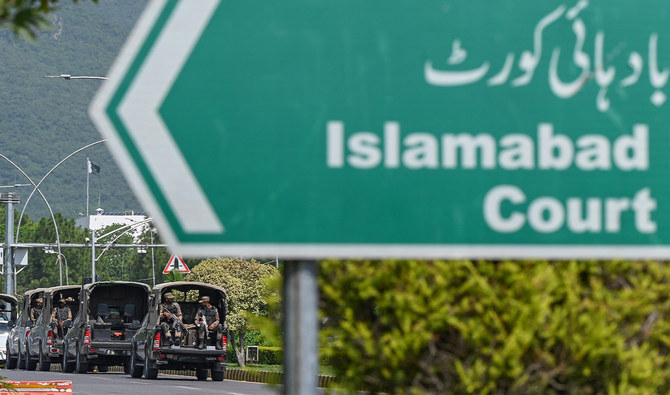ISLAMABAD: A Pakistani high court on Tuesday issued notices to the country’s information ministry and its telecommunication authority on a plea challenging the ban on social media platform X, local media widely reported.
X first went down on Feb. 17 when a government official confessed to manipulating votes in Pakistan’s Feb. 8 general election. The admission came as former prime minister Imran Khan’s Pakistan Tehreek-e-Insaf (PTI) and other political parties staged protests countrywide, alleging the Election Commission of Pakistan (ECP) had rigged elections, which it denies.
Pakistani authorities remain tight-lipped about the ban, with Caretaker Information Minister Murtaza Solangi saying last week the government did not impose any ban on the platform.
X’s disruption has raised widespread concerns about the state of democratic freedoms in the country, with the United States and several international organizations urging Pakistan to provide unhindered Internet access and leading digital rights activists calling the blockade a “blatant violation” of civil liberties.
Islamabad High Court (IHC) Chief Justice Aamer Farooq took up a plea challenging X’s restriction, Pakistani English language newspaper Dawn reported. Lawyers Sardar Masroof and Amna Ali appeared before the court on behalf of the petitioner, an Islamabad resident named Ehtisham Abbasi. The judge asked if X was accessible for Pakistani users to which Masroof responded that it has been banned since Feb. 17.
“Subsequently, the IHC issued notices to the respondents, including the information ministry and the Pakistan Telecommunication Authority (PTA), and adjourned the hearing till next week,” Dawn said. Other Pakistani media also widely reported on the development.
The ban continues to remain in force despite a Sindh High Court (SHC) order on Feb. 21, in which the court ordered the PTA to restore X and other social media platforms in the country. The SHC is holding a contempt of court hearing against the PTA for allegedly violating the high court’s orders on restoring X.
Before the latest blockade, Pakistan experienced multiple Internet disruptions in recent weeks that made social media platforms such as Facebook, YouTube, X and Instagram inaccessible. Recent occurrences were on Jan. 20, Jan. 7, and Dec. 17, when Khan’s PTI party was holding virtual events. The government had blamed those disruptions on “technical glitches.”
Such shutdowns have previously had a devastating impact on Pakistan’s economy. The day after Khan’s arrest in May last year, Reuters reported that point-of-sale transactions routed through Pakistan’s main digital payment systems fell by around 50 percent according to the region’s two largest payments system operators, 1LINK and Habib Bank Limited.
According to the Internet Society’s monitor Pulse, it is becoming an increasingly common tactic for governments to shut down the Internet on a national or sub-national level to either control civil unrest, stem the flow of misinformation, sway the results of general elections or to gain strategic advantages in territories with ongoing wars.
















